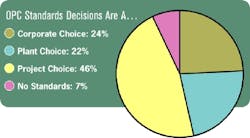Standards, Reliability Critical to OPC Success
Respondents were asked to select the top three criteria for their organizations when choosing a vendor. Of more than 800 respondents, 26 percent chose “standards and open systems” as one of their top three criteria in vendor selection. Twenty-two percent selected “reliability” as a top-three criterion; 15 percent selected “price” and 15 percent selected “interoperability.” Weighing in with about 5 percent of the vote each were criteria for security, Web-based technologies and redundancy.
OPC, an interoperable communications standard, enjoys widespread adoption, according to the survey. Of the survey respondents, 77 percent use the OPC standard in their operations and an additional 17 percent plan to use OPC in the future.
Taking responsibility
Decision authority for the use of OPC standards varies by organization. Twenty-four percent of respondents said the responsibility for determining OPC usage and standards lies at the corporate level, and 22 percent said OPC decisions are made at the site or plant level. However, the majority of respondents—46 percent—said that OPC standards and usage decisions are made at the individual project level. Seven percent of respondents said their organizations do not use OPC standards.
Survey respondents were asked to what level they expect their suppliers to support OPC standards. Thirty-one percent of respondents said their suppliers must be certified and pass interoperability tests with other vendors’ products. Seventeen percent said the supplier must be OPC-certified. Thirty-six percent want their suppliers to support OPC with products. Six percent said their suppliers must support OPC in the future, while only 10 percent did not require their suppliers to support OPC.
Use of OPC technology spans all layers of the plant, from the plant-floor controller layer through the business layer. Fifty-five percent of respondents use or plan to use OPC-certified products at the distributed control system (DCS)/programmable logic controller (PLC) level. Seventy percent use or plan to use OPC at the supervisory control level. Thirty-two percent use or plan use of OPC at the manufacturing execution system (MES) layer, and 12 percent use or plan to use OPC to exchange data with the enterprise resource planning (ERP) system.
The OPC Survey was sponsored by the OPC Foundation and Automation World. The 880 survey respondents represent a cross-section of industry, with nearly 50 percent who are members of the automation, control and instrumentation businesses that develop and deploy OPC in their automation solutions. The remaining 50 percent are users of OPC technology, and work in manufacturing industries ranging from food and beverage to chemicals, utilities and petroleum.

